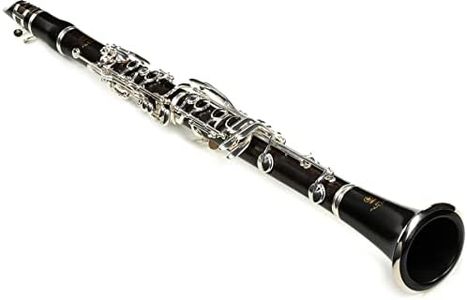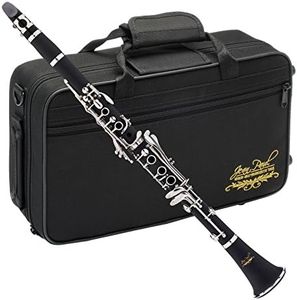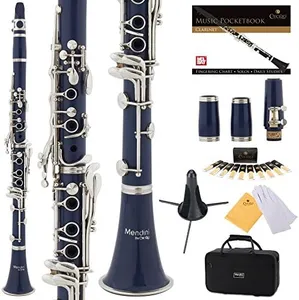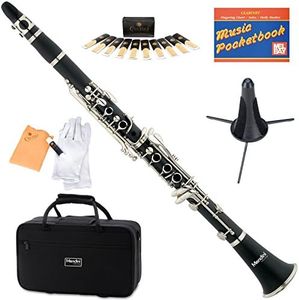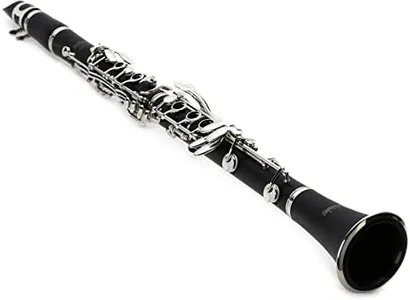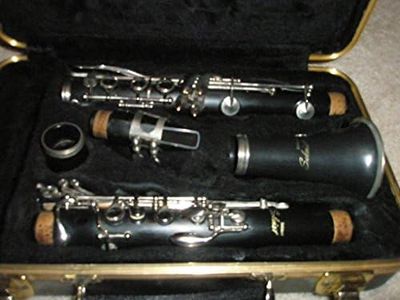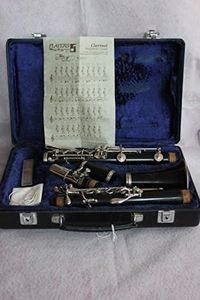10 Best Clarinets 2025 in the United States
Our technology thoroughly searches through the online shopping world, reviewing hundreds of sites. We then process and analyze this information, updating in real-time to bring you the latest top-rated products. This way, you always get the best and most current options available.

Our Top Picks
Winner
Yamaha YCL-255 Student Clarinet with Nickel Keys
Most important from
138 reviews
The Yamaha YCL-255 Student Clarinet is designed specifically for novice players. It features a durable matte ABS resin body, making it lightweight and easy to handle. Additionally, the nickel-plated keys contribute to the overall durability and a modern aesthetic. With a 4C mouthpiece included, beginners can expect a standard and comfortable playing experience right out of the box.
The clarinet is tuned in B flat, suitable for a wide range of musical styles, which makes it versatile for any beginner exploring different genres of music. Measuring at 14.96 x 5.91 x 12.2 inches and weighing 4.63 pounds, it is compact and portable, adding to its convenience for young musicians or students.
However, one drawback could be its resin body, which may not provide the same warm tone as a wooden clarinet might offer. Yet, for beginners, this material ensures longevity and easier maintenance. In essence, the Yamaha YCL-255 is a commendable choice for those new to the clarinet, balancing ease of use with quality construction.
Most important from
138 reviews
Glory GLY-PBK Professional Ebonite Bb Clarinet with 10 Reeds, Stand, Hard Case, Cleaning Cloth, Cork Grease, Mouthpiece Brush and Pad Brush, Black
The Glory GLY-PBK Professional Ebonite Bb Clarinet is a solid choice for both beginners and intermediate players. Made from ebonite, a durable and high-quality material, it offers excellent sound quality and longevity. The B flat key system is standard for most clarinets, making it easy to find sheet music and play with other musicians. The bore size is typical for a professional clarinet, providing a good balance between ease of play and sound projection.
The included mouthpiece is decent, though some more advanced players might prefer to upgrade it for better performance. Having 10 reeds included is a nice bonus, as it allows you to start playing immediately without needing to purchase additional accessories. The ligature is functional but might not hold up under intense use over time. The hard case, stand, cleaning cloth, cork grease, mouthpiece brush, and pad brush are all useful accessories that help maintain the instrument's condition and ease of use.
The item weight of 4 pounds might be slightly heavy for younger players or those needing to transport it frequently. This clarinet provides a comprehensive starter package with good value for money, suitable for students and casual players looking for durability and decent sound quality.
Yamaha YCL-650II Professional Bb Clarinet with Silver-plated Keys
The Yamaha YCL-650II Professional Bb Clarinet is an ideal choice for serious clarinetists, thanks to its high-quality materials and craftsmanship. The body is made from Grenadilla, which is known for its rich tone and durability, making it suitable for both beginners and advanced players. The silver-plated keys not only enhance the instrument's aesthetic appeal but also provide a smooth and responsive playing experience, which can be particularly beneficial for those who perform regularly.
In terms of playability, the design features a well-balanced bore size that supports excellent intonation and projection. This can help musicians achieve a clearer sound, whether they are playing in an orchestra or a solo setting. The inclusion of a barrel and bell further contributes to the clarinet’s sound quality.
The YCL-650II may not be the best fit for absolute beginners, primarily due to its professional-grade features and price point, which is higher than entry-level models. Players just starting out may find it more challenging to manage the reed strength and mouthpiece adjustments that come with more advanced instruments. Additionally, at 5.83 pounds, it could feel somewhat heavy for younger or less experienced players who require a lighter option.


